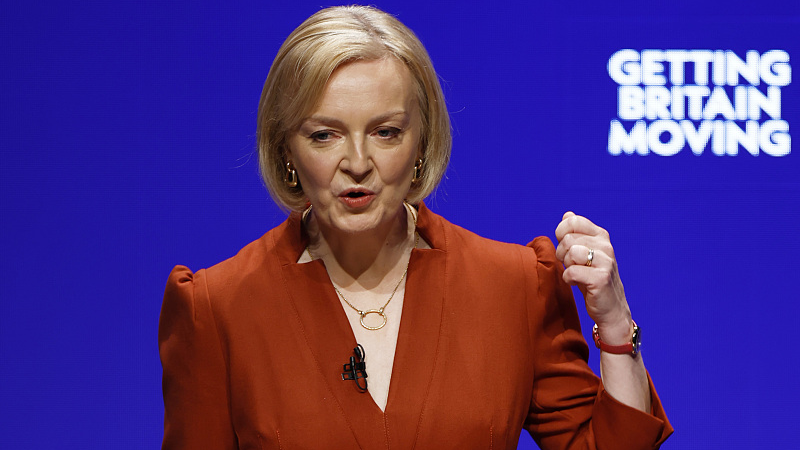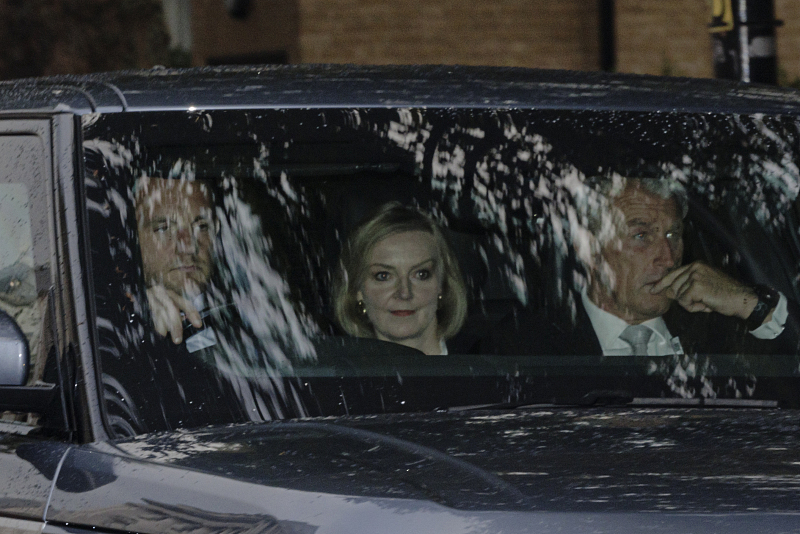
UK Prime Minister Liz Truss speaks during the final day of the Conservative Party Conference in Birmingham, England, October 5, 2022. /CFP
UK Prime Minister Liz Truss speaks during the final day of the Conservative Party Conference in Birmingham, England, October 5, 2022. /CFP
Editor's note: Thomas O. Falk is a London-based political analyst and commentator. He holds a Master of Arts in international relations from the University of Birmingham and specializes in U.S. affairs. The article reflects the author's opinions and not necessarily the views of CGTN.
Amid an economic crisis, government disagreements are causing extra layers of uncertainty in the country, and Prime Minister Liz Truss is under increasing pressure after only four weeks in office.
It's only been a week since the new government's tax plans were revealed. With a "trickle-down economics" approach, Liz Truss sought to boost the economy swiftly. However, her plan caused not only turbulence in the financial markets and criticism from the population but also an outcry from within the party.
Now, Truss has been forced to announce a U-turn on her policies.
Arguably the most controversial part of her tax plans, the top rate of 45 percent paid on earnings over 150,000 pounds a year, will not be scrapped after all. However, other controversial parts of the economic plan will, for now, remain in place – including tax cuts for different income groups despite massive inflation.
However, Truss' U-turn didn't happen voluntarily. Prominent party members had openly criticized the tax breaks, the mini budget, and the enormous national debt Truss' agenda would cause and indicated that they intended to vote against them in Parliament. Truss was faced with a potential rebellion that could have ended her tenure.
Nonetheless, the results are currently a great deal of uncertainty, and quite a few in the country are criticizing the chaos in which the new government, led by Liz Truss, has started.
What's more, Truss' U-turn is nothing less than a startling political and financial misjudgment that reveals personal weaknesses that her party colleagues will not forget. The political mistakes, in particular, are already pointing to a challenging future for the PM four weeks after taking office.
After all, Liz Truss was not and is not the darling of the party base – unlike her predecessor Boris Johnson. Instead of earning the trust of the party base and her colleagues as a Prime Minister who delivers stability, vision and solutions, she did the opposite by presenting an economic package that was unacceptable to anyone but herself.
Truss tried to conduct an economic paradigm shift without plausibly showing the chances of success, which is always a political quagmire. And unlike Truss' role model Margaret Thatcher, Britain isn't currently paralysed in a structural crisis but economic chaos. Her approach thus felt misguided from the beginning.

UK Prime Minister Liz Truss is seen returning to Downing Street in London, England, September 27, 2022. /CFP
UK Prime Minister Liz Truss is seen returning to Downing Street in London, England, September 27, 2022. /CFP
This becomes even more apparent when looking at this economically. The most significant economic and social problem of the present remains high inflation. Truss' answer is a state-financed energy price cap for everyone and substantial tax cuts on credit, which increases the national debt tremendously.
In turn, this drives demand and, thus, inflationary pressure further in Britain. The fallout was immediately felt the previous week: Market interest rates skyrocketed, and the pound found itself at a historic low – further contributing to increased cost of living for millions of British people.
With the threatened rebellion, Truss' colleagues have now shown that all of this was unacceptable. At the same time, it made it clear to Truss that her power is very limited. However, and the question must be allowed, how relevant and impactful is a PM who cannot assert herself at the first stiff test? And how can such an experienced top politician make such grave mistakes right at the beginning of her term in office?
With the end of the turbulent Boris Johnson era, things were supposed to get back to normal in Westminster. This is precisely what is needed in the face of the crises plaguing the country. Stability and trust are required. But the PM seems to have already lost the latter – especially with the population. A petition for new elections has already obtained more than 500,000 signatures.
If she doesn't find a way to regain approval through good communication and via outlining a coherent plan for how the UK will get through the winter, Truss might have a hard time in her own party, which is looking at the next general election in two years' time with growing nervousness.
Right now, new elections would be a disaster for the party, as the Tories trail Labour 21 percent to 54 percent. With that in mind, the pressure on Truss is immense. At the same time, however, it also means that the rebellion that has now been averted, for the time being, may not have been the last.
If the polls under Truss remain disastrous, and given this winter's forecast it is hard to imagine a significant upward trend, many Tories will fear for their seats in Parliament and could decide to replace Truss as an ultima ratio.
Truss is hence busy on three fronts: the economy, regaining the trust of the population and the support of her own party. Only one thing is currently certain: Truss is fighting for political survival while the UK is struggling with itself – a highly inopportune situation, given the challenges ahead.
(If you want to contribute and have specific expertise, please contact us at opinions@cgtn.com. Follow @thouse_opinions on Twitter to discover the latest commentaries on CGTN Opinion Section.)